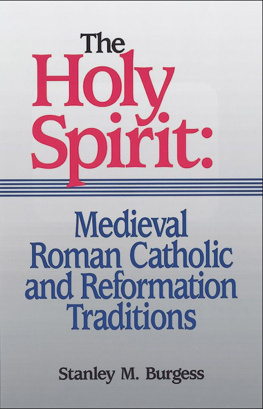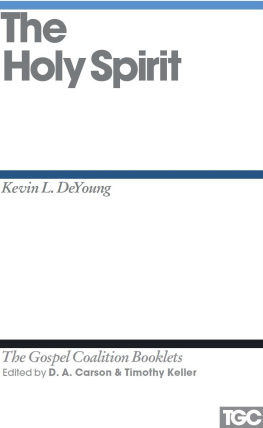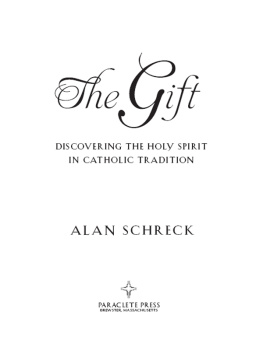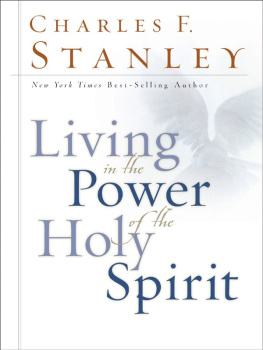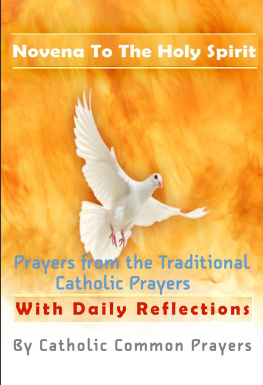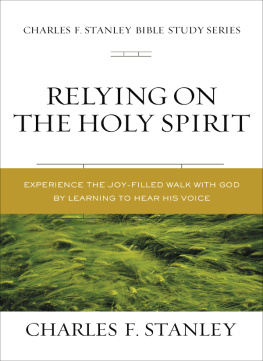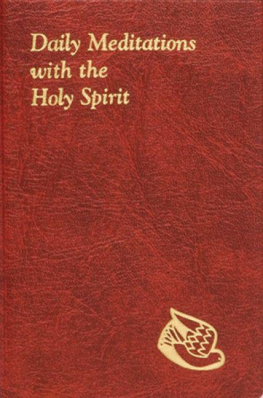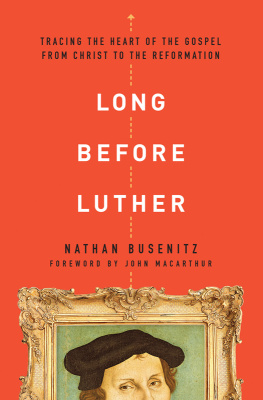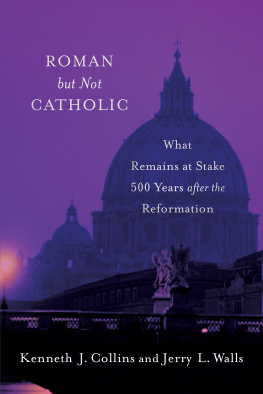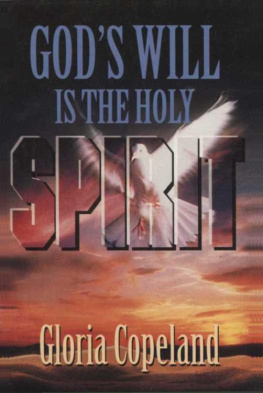Stanley M. Burgess - Holy Spirit: Medieval Roman Catholic and Reformation Traditions, The
Here you can read online Stanley M. Burgess - Holy Spirit: Medieval Roman Catholic and Reformation Traditions, The full text of the book (entire story) in english for free. Download pdf and epub, get meaning, cover and reviews about this ebook. year: 1994, publisher: Baker Publishing Group, genre: Religion. Description of the work, (preface) as well as reviews are available. Best literature library LitArk.com created for fans of good reading and offers a wide selection of genres:
Romance novel
Science fiction
Adventure
Detective
Science
History
Home and family
Prose
Art
Politics
Computer
Non-fiction
Religion
Business
Children
Humor
Choose a favorite category and find really read worthwhile books. Enjoy immersion in the world of imagination, feel the emotions of the characters or learn something new for yourself, make an fascinating discovery.
- Book:Holy Spirit: Medieval Roman Catholic and Reformation Traditions, The
- Author:
- Publisher:Baker Publishing Group
- Genre:
- Year:1994
- Rating:5 / 5
- Favourites:Add to favourites
- Your mark:
- 100
- 1
- 2
- 3
- 4
- 5
Holy Spirit: Medieval Roman Catholic and Reformation Traditions, The: summary, description and annotation
We offer to read an annotation, description, summary or preface (depends on what the author of the book "Holy Spirit: Medieval Roman Catholic and Reformation Traditions, The" wrote himself). If you haven't found the necessary information about the book — write in the comments, we will try to find it.
Holy Spirit: Medieval Roman Catholic and Reformation Traditions, The — read online for free the complete book (whole text) full work
Below is the text of the book, divided by pages. System saving the place of the last page read, allows you to conveniently read the book "Holy Spirit: Medieval Roman Catholic and Reformation Traditions, The" online for free, without having to search again every time where you left off. Put a bookmark, and you can go to the page where you finished reading at any time.
Font size:
Interval:
Bookmark:

1997 by Stanley M. Burgess
Published by Baker Academic
a division of Baker Publishing Group
P.O. Box 6287, Grand Rapids, MI 49516-6287
www.bakeracademic.com
Ebook edition created 2013
All rights reserved. No part of this publication may be reproduced, stored in a retrieval system, or transmitted in any form or by any meansfor example, electronic, photocopy, recordingwithout the prior written permission of the publisher. The only exception is brief quotations in printed reviews.
ISBN 978-1-4412-4236-5
Library of Congress Cataloging-in-Publication Data is on file at the Library of Congress, Washington, DC.
The Spirit filled a boy who played upon a harp and made him a psalmist (1 Sam 16:18), a shepherd and herdsman who pruned sycamore trees and made him a prophet (Amos 7:1415), a boy given to abstinence (Dan 1:8) and made him a judge of mature men, a fisherman and made him a preacher (Matt 4:19), a persecutor and made him the teacher of Gentiles (Acts 9:120), a tax collector and made him an evangelist (Luke 5:2728). What a skillful workman this Spirit is! The Spirits very touch is teaching. It changes a human mind in a moment to enlighten it; suddenly what it was it no longer is, suddenly it is what it was not.
Gregory the Great
Holy Spirit, making life alive,
moving in all things, root of all creative being,
cleansing the cosmos of every impurity,
effacing guilt, anointing wounds.
You are lustrous and praiseworthy life,
you waken and re-awaken everything that is.
Holy Spirit,
through you clouds billow, breezes blow,
stones drip with trickling streams,
streams that are the source of earths lush greening.
Likewise you are the source of human understanding,
you bless with the breath of wisdom.
Thus all of our praise is yours,
you who are the melody itself of praise,
the joy of life, the mighty honor,
the hope of those to whom you give the gifts of the light.
Hildegard of Bingen
The Holy Spirit has called me through the Gospel, enlightened me with his gifts, and sanctified and preserved me in true faith, just as he calls, gathers, enlightens, and sanctifies the whole Christian church on earth and preserves it in union with Jesus Christ in the one true faith.
Martin Luther

Table of Contents

Abbreviations
AASS | Acta sanctorum quotquot toto orbe coluntur. Paris: V. Palme, 18631940. |
CCCM | Corpus Christianorum: Continuatio mediaevalis. Turnhout, Brepols, 1969. |
CCSL | Corpus Christianorum: Series latina. Turnhout, Brepols, 1953. |
CWS | Classics of Western Spirituality. New York/Mahwah: Paulist, 1978. |
FC | The Fathers of the Church. Washington: Catholic University of America Press, 1947. |
LCC | The Library of Christian Classics. Philadelphia: Westminster, 1953. |
PL | Patrologiae cursus completus: Series latina. Jacques Paul Migne, ed. Paris, J. P. Migne, 18441904. |
SC | Sources chrtiennes. Paris: Cerf, 1943. |

Acknowledgments
I wish to express my appreciation to Southwest Missouri State University, Springfield, Missouri, for support in providing summer faculty fellowships, reduced teaching loads, and a 1993 sabbatical leave. I also am indebted to the Andrew W. Mellon Foundation for funds to study in the Vatican Film Library at the Pius XII Memorial Library, Saint Louis University. Again, I highly value the time spent at St. Johns University in Collegeville, Minnesota, studying manuscripts housed in the Hill Manuscript Library. I am appreciative to Gordon-Conwell Theological Seminary, South Hamilton, Massachusetts, for providing housing while I was working in the libraries of the Boston Theological Institute.
Special thanks to the many friends and professional colleagues who have encouraged and assisted me in preparing this work. I am especially grateful to my wife, Ruth, for her patience and spirit of enthusiasm, which inspired me to complete this trilogy.

Introduction
Completion of a Trilogy
This is the final volume in a trilogy on the concept of the Holy Spirit in the history of Christianity. Volume one treats the ancient church, volume two Eastern Christian traditions. This third volume is devoted exclusively to Western Christianity from the beginning of the Middle Ages in the sixth century through the sixteenth-century Reformation.
Because this work covers eleven centuries, it has been necessary to be highly selective rather than comprehensive. Those Christian thinkers or groups which have been included represent theological emphases of their times, although most of them also helped to shape those times and a few, such as Bernard of Clairvaux, Bonaventure, Thomas Aquinas, Martin Luther, John Calvin, and Ignatius Loyola, were dominant forces. Naturally, all of them had something significant to say about the divine Third Person. In the process, I have excluded such prominent individuals as Albert the Great, Alcuin, Angela of Foligno, Balthasar Hubmaier, Robert Bellarmine, Benedict of Nursia, Boethius, Dionysius (Denis) the Carthusian, Dorothy of Montau, Hans Denk, Hugh of St. Victor, Kaspar von Schwenckfeld, Mechtild of Magdeburg, Meister Eckhart, Nicholas of Cusa, Jan van Ruysbroeck, Heinrich Suso, John Tauler, Teresa of Avila, and John Wycliffeeach of whom spoke or wrote about the Holy Spirit.
From one perspective, it can be argued that the Holy Spirit was a central concern for each of the individuals featured in this work. For one thing, all were concerned with issues relating to the Trinity, and, as a consequence, the Holy Spirit was featured in many of their writings. On the other hand, it would be dishonest to suggest that the divine Third Person was as important an issue as the Second Person. Western Christians usually were strongly Christocentric.
Those who did treat the Holy Spirit as their primary theme often came from two groups. The first were those who argued the Roman Catholic case for the Filioque against Eastern Christians, insisting that the Spirit proceeded from both the Father and the Son.
The second included a variety of fringe elements, each of whom believed that the Holy Spirit in some ways intervened in human affairs, superseding established Roman practices and beliefs. Among the most interesting were the dispensationalists, who predicted a coming age of the Spirit in which all would be perfected. Especially troubling to the Roman church were the radical dualists who viewed the Holy Spirit as an active agent among true Christians, representing forces of good in their cosmic struggle with evil. Finally, certain of the spiritualists and mystics claimed that the Holy Spirit spoke directly to them, revealing the divine will.
Our study opens with Pope Gregory the Great (540?604), who bridges the ancient and medieval periods in church history. While theologically orthodox, he also reminds us that many Western Christians in his troubled time had a deep belief in the intervention of the Holy Spirit in everyday life. The Venerable Bede (ca. 673735), an English historian writing a century later, is also a witness to the faith of his age and the strong belief of his contemporaries in the supernatural.
Next pageFont size:
Interval:
Bookmark:
Similar books «Holy Spirit: Medieval Roman Catholic and Reformation Traditions, The»
Look at similar books to Holy Spirit: Medieval Roman Catholic and Reformation Traditions, The. We have selected literature similar in name and meaning in the hope of providing readers with more options to find new, interesting, not yet read works.
Discussion, reviews of the book Holy Spirit: Medieval Roman Catholic and Reformation Traditions, The and just readers' own opinions. Leave your comments, write what you think about the work, its meaning or the main characters. Specify what exactly you liked and what you didn't like, and why you think so.

